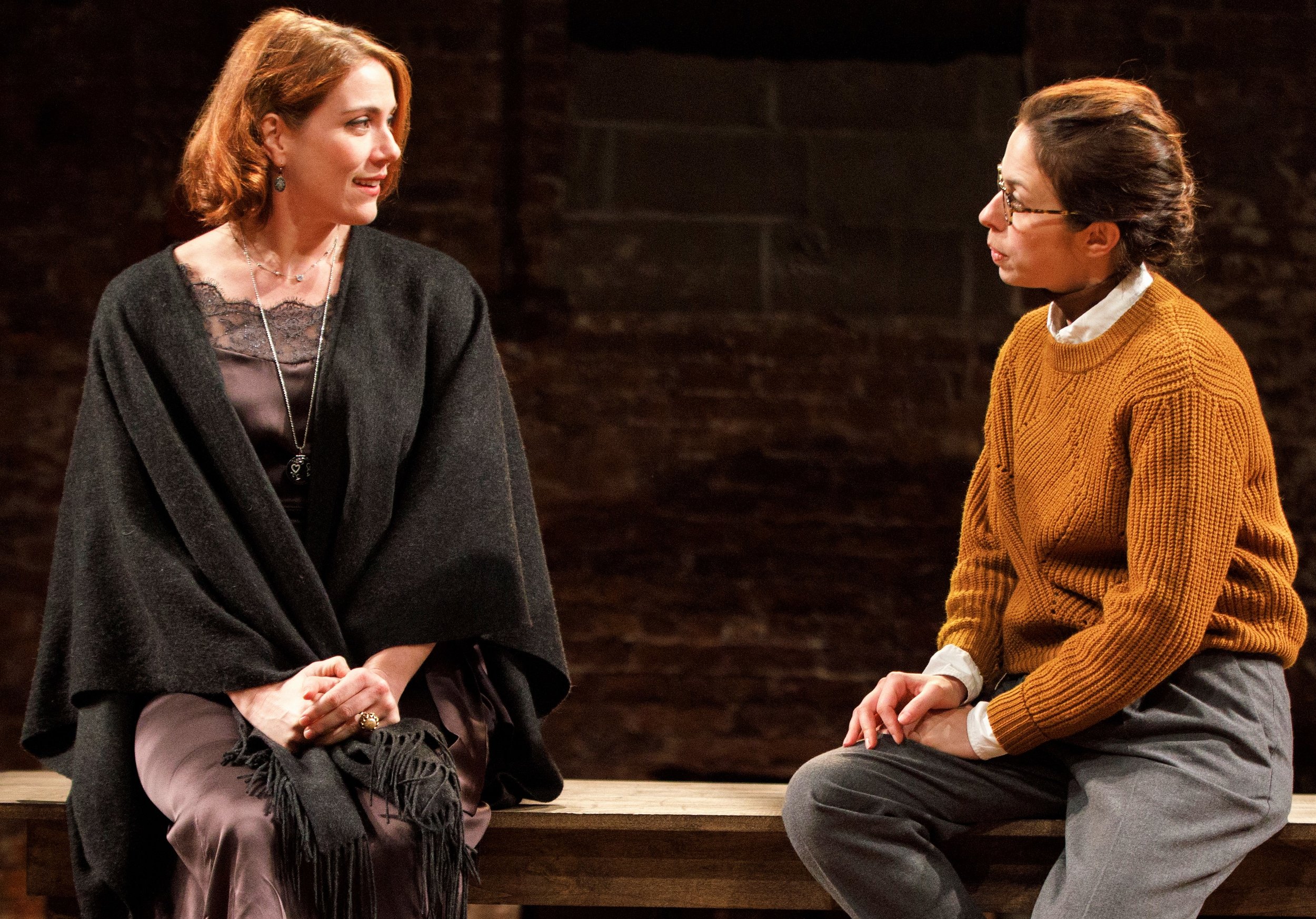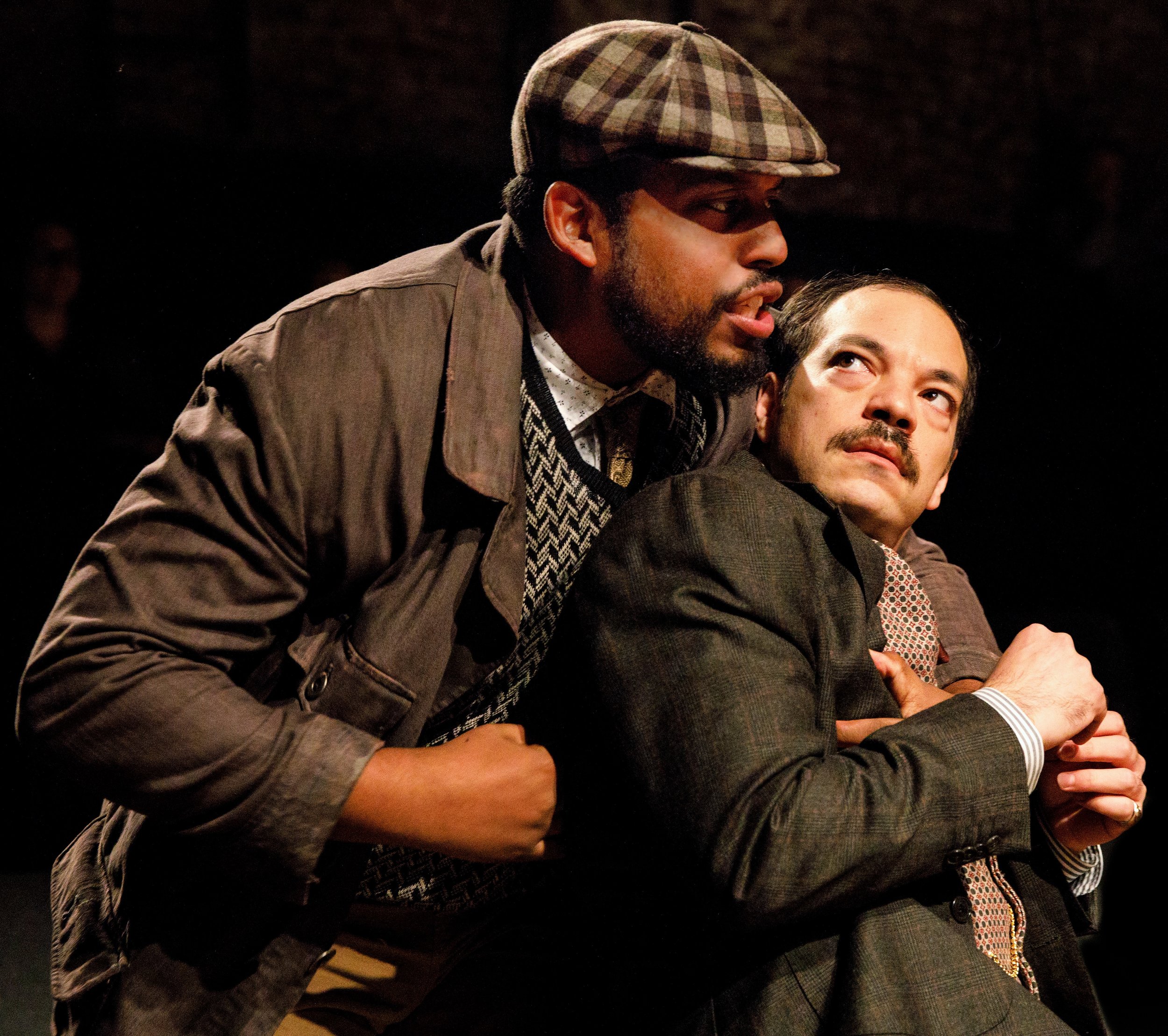The Fiasco Theater production of Twelfth Night is energetic, clearly spoken and firmly middle-of-the-road. The company, with standard members, must try to cast every actor in a part, even if the requirements are slightly off. In Shakespeare’s story of twins, a brother and sister, who are shipwrecked in a foreign country, Illyria, where they have amorous mix-ups before they are reunited, an audience may notice that Emily Young’s slender Viola bears little resemblance to Javier Ignacio’s chunkier Sebastian, apart from wearing glasses and a ribbed, russet sweater, though it’s unlikely that will spoil one’s enjoyment.
Viola disguises herself as a page named Cesario and ends up in the service of Orsino, the Duke of Illyria, who is wooing Countess Olivia, deep in mourning for her late brother. Viola becomes Orsino’s emissary, but Olivia falls for Cesario, who becomes the object of disdain for Olivia’s retinue, which includes her steward Malvolio; her uncle, Sir Toby Belch; and his hangers-on, among them Feste, the lady’s maid Maria, and another suitor named Sir Andrew Aguecheek.
Andy Grotelueschen (left) is Sir Toby Belch and Paco Tolson is Sir Andrew Aguecheek in Fiasco Theater's production of Shakespeare's Twelfth Night at Classic Stage Company. Top: Jessie Austrian (left) is Olivia, and Emily Young is Viola, disguised as Cesario, a page.
Anyone who may have seen a truly great production—just a couple seasons ago, Mark Rylance’s Globe Theatre on Broadway, or Michael Grandage’s 2008 London production with Derek Jacobi in an Olivier Award–winning performance as Malvolio, or Ian Judge’s wintry Elizabethan version in 1994 at Stratford-upon-Avon—will find this staging by co-directors Ben Steinfeld and Noah Brody a respectable rendering that nonetheless shows effort. Lines are often shouted, and subtlety is not a hallmark. The speakers manage clarity and projection, thankfully, and the story comes through, although little of the music or the language does—notably in Emily Young’s “Make me a willow cabin by your gate” speech, more declaimed than poetically felt.
Then, too, Twelfth Night has a host of inscrutable comic lines, mostly among Olivia’s household, that are often dead on arrival—“passy measures pavin,” “Sneck up!”—and obscure references, such as “the lady of the Strachy” and “the Sophy.” Perhaps wisely, Fiasco doesn’t shrink from goosing the play, using energetic sea chanteys sung a cappella; gentle audience interplay; and sometimes interpolations.
“For what says Quinapalus?” the clown Feste asks in a dire example. Then Steinfeld cannily lets his question hang in the air before a nifty ad-lib, “I’ll remind you,” and continues with “Better a witty fool than a foolish wit.” (It’s hardly a joke worth waiting for, but the ad-lib turns it around.)
Most productions take a cue from the line that Sir Andrew’s hair “hangs like flax on a distaff” to make him blond, but here the actor is black-haired Paco Tolson, who resembles the 1950s comic Jerry Colonna. Like Colonna, he is given to making weird gurgles and sounds and funny faces. He has a moment where the information he’s been given overloads his brain and he mimes an exploding head, with a vocal accompaniment. (The actor later appears briefly as a gimpy, squinty, tic-ridden priest and makes a feast of it.) Tolson is one of the chief assets of the show, but there are others.
Tolson with David Samuel as Fabian. Photographs by Joan Marcus.
Steinfeld plays Feste and sings, and he has a lovely voice. The settings for the music are not identified in the program, but they are delicate and melodic—qualities that don’t apply to much of the production.
There are sporadic bright spots nonetheless. Brody as Orsino has the looks of a leading man, and he brings a sudden spitefulness to the scene when he learns his page has married Olivia. Tina Chilip as Maria and Paul L. Coffey as Malvolio, less pompous than crabbed, handle the language with variety and occasional music, yet are dragged over the top at times in group scenes.
Some of the physical business works, as when Sir Toby dresses down Malvolio, who has upbraided him for roistering late at night. “Art more than a steward?” Toby asks, haughtily handing Malvolio an hors d’oeuvres tray to take away. And as Malvolio answers, he hands the tray to Maria, his own underling, whom he knows Sir Toby has affection for. The unexpected subtlety is startlingly effective.
John Doyle’s set of trunks, ropes and metal chandeliers echoes his earlier production this season of As You Like It: it suggests strolling players putting on a show. The costumes by Emily Rebholz make use of vests, tweeds and corduroy to evoke rural Britain; the only clue to a time period is an early aviator cap and goggles that Sir Andrew appears in. So where could Olivia pick up her disdain for “yellow stockings and cross-gartered” clothing? Not here. There’s no pretense of rationality in Malvolio’s outlandish fisherman’s outfit with rubber boots, slicker and rain hat, cross-gartered on the thighs. But then, this production too often reaches for a Three Stooges sensibility, when one hopes for more.
Fiasco Theater’s Twelfth Night plays through Jan. 6 at Classic Stage Company (136 East 13th St.) Evening performances are at 7 p.m. Tuesday through Thursday and 8 p.m. Friday and Saturday; matinees are at 3 p.m. Saturday and Sunday. Tickets are $61 and can be ordered by calling (212) 352-3101 or (866) 811-4111, or in person at the box office, or by visiting classicstage.org.





